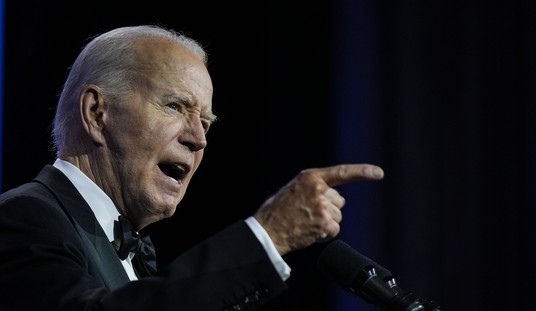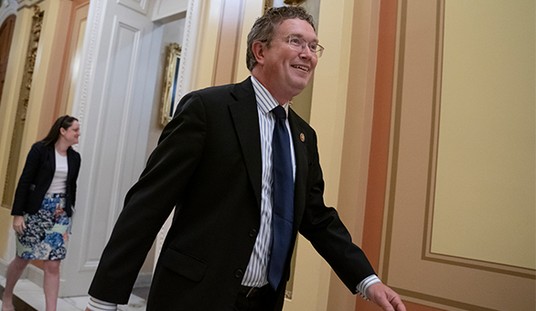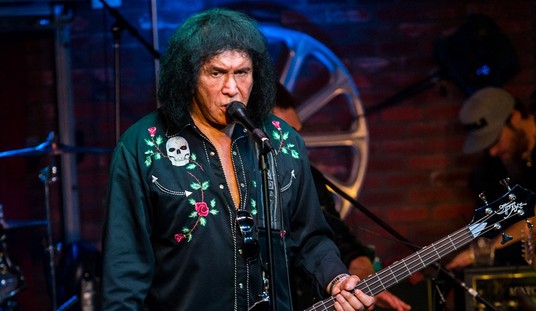President Obama’s awarding of a Presidential Medal of Freedom to former UN High Commissioner for Human Rights Mary Robinson has sparked widespread criticism. Commentators have pointed to Robinson’s role in the infamous 2001 Durban “anti-racism” conference and, more generally, to what UN Watch has suggested is a long record of bias against Israel.
Oddly enough, however, little has been made of Robinson’s views on America. More specifically, her once-upon-a-time controversial criticisms of the Iraq war and the “war on terror” appear to have fallen into a memory hole.
And yet it is surely the latter — and not her forays into the Middle East conflict — that inspired the current American administration to honor Robinson as an Obamaesque “agent of change.”
As a politician who rose to prominence virtually overnight as a militant opponent of George Bush’s “wrong war of choice,” it is hardly surprising that Obama would want to honor an international dignitary who, back in the day, was one of the more prominent voices to oppose the Iraq war before it happened. Thus, in February 2003, not yet six months after the end of her term as high commissioner, and a month before the start of the U.S.-led invasion, Robinson penned an editorial for the Irish Times titled “War not the way to restore human rights to Iraq”. Never mind that nobody had said that the war was about “restoring human rights” and that Robinson had raised no such objections regarding NATO’s ostensible “humanitarian intervention” in Kosovo four years earlier.
Closely following the playbook established by Jacques Chirac’s and Gerhard Schröder’s Franco-German “axis of peace,” Robinson accused the Bush administration of “unilateralism” and insisted, in the name of international law, that the UN Security Council must be given the last word on whether an intervention would take place. She even remembered to observe that it was the “gearing-up” for a war in Iraq that had caused the American administration to “[lose] so much of the worldwide support and sympathy which were manifest in the months following … 9/11.” This is, of course, just the “myth of squandered sympathy” that one year later would form the centerpiece of the Democratic Party’s failed 2004 presidential campaign.
In that same year, Robinson would take up a professorship at Columbia University in New York. Discussing the Iraq war in a November 2005 interview with Reuters, she remarked cheerfully that “what I find living now in the United States is an encouraging, wide sense of some of the checks and balances kicking in. … In Congress you have, at last, a sense, of ‘we were misled, we should have been more attentive.’” “It was not a legitimate war,” Robinson told Reuters flatly, “and I am glad that more and more people … are coming out to say so.” “The poor, beleaguered people of Iraq are not better off,” she added. Apart from respect for the office of the presidency, why, after all, should Obama not want to honor someone who provided a touch of gravitas to “Bush lied, people died”?
It is interesting to note that in her 2005 Reuters interview, Robinson chose to describe the Iraq war as “illegitimate.” By repeatedly taxing the Yugoslav government with human rights violations in Kosovo in her capacity as UN high commissioner, Robinson herself massively contributed to the public “legitimacy” enjoyed by NATO’s aerial war against Yugoslavia in 1999. But, as it happens, that war was conducted without any UN Security Council mandate.
At the time, this point posed no greater problem to Gerhard Schröder and Jacques Chirac than it did to Mary Robinson. Robinson — along with kindred spirits like Samantha Power or Susan Rice, current American ambassador to the UN — might want to believe that the Kosovo War was somehow “legitimate” even without a UN mandate. But it was obviously illegal under the UN charter, which only recognizes self-defense and threats to international peace as legitimate grounds for states to undertake military action against other states. The charter makes no provision for states to attack other states in the name of defending human rights.
Moreover, Robinson not only criticized the Bush administration over the Iraq war. More fundamentally, while still UN human rights commissioner, Robinson already crossed swords with the Bush administration over its conduct of the war on Islamic terror organizations. Thus, in January 2002, she responded to the opening of the Guantánamo Bay prison camp by insisting that the U.S. must afford Geneva Convention protections not only to captured Taliban fighters, but even to al-Qaeda members.
After years of hectoring by European governments and EU-sponsored NGOs — and following the Supreme Court’s 2006 Hamdan ruling — this would, of course, also become U.S. government policy. But at the time, the idea of affording Geneva Convention protections to members of international terror networks was so wildly counter-intuitive that even the European Parliament rejected it. Rather, the parliament found that the standards set out in the Geneva Conventions “must be revised to respond to the new situations created by the development of international terrorism.”
By contrast, over the next several months, Robinson used her UN bully pulpit to insist that the Geneva Conventions were entirely adequate as is. She also accused the U.S. of responding to the 9/11 attacks in such a way as to undermine civil liberties not only at home, but around the world.
Indeed, Robinson denied outright that the 9/11 attacks constituted an act of war. Thus, for instance, in a June 15, 2002, editorial in the French daily Le Monde, she suggested that talk of a “war” on terrorism was merely an unfortunate choice of words. The fact she herself had called for captured al-Qaeda members to be treated precisely as prisoners of war under the Geneva Conventions appeared not to trouble her in this connection.
As if this was a choice between mutually exclusive alternatives, Robinson proposed that instead of talking of “war,” the 9/11 attacks ought rather to be qualified as “crimes against humanity.” The import of the would-be distinction appeared to be that combating the “perpetrators” could then be handled via ordinary civilian jurisdictions — or, at any rate, in some sort of court and not on the battlefield. Thus, in a 2003 foreword to the academic volume Wars on Terrorism and Iraq, she asked:
[M]ay it not have been a strategic error to characterize the attacks of September 11 as requiring a “war on terrorism” rather than as “crimes against humanity” that required intense international military, police, and intelligence cooperation to bring the perpetrators to justice?
The rest of the essay makes clear that the question is merely rhetorical. Thus, for example, Robinson writes that the use of “the language of being ‘at war with terrorism’” had “nefarious” implications. And she suggested that “the terrorists” ought rather “to be branded as terrible criminals” — as if she was entirely unfamiliar with the notion of a “war crime” or as if the designation “terrible criminals” would make al-Qaeda’s declared war on America magically disappear.
For good measure, Robinson also finds space to denounce “a pattern of actions by the administration of President George W. Bush since September 2001 that is at odds with core U.S. and international human rights principals.” Needless to say, the intelligence measures undertaken by the Bush administration to discover and disrupt terror networks come in for special criticism in this regard.
With the Obama administration busily rolling back the “war on terror” in both rhetoric and practice, it is not hard to appreciate why Robinson’s ideas on the subject would endear her to it. As fuzzy as Robinson’s logic may be, the practical upshot is clear: that the United States should return to the pre-9/11 “legal” footing for combating Islamic terror groups.
Among other things, the Presidential Medal of Freedom is awarded for “especially meritorious contributions to the security or national interests of the United States.” Whether Mary Robinson’s agitation against the “war on terror” represents such a contribution is very open to doubt. The most obvious proof to the contrary is provided by the 9/11 attacks themselves.









Join the conversation as a VIP Member